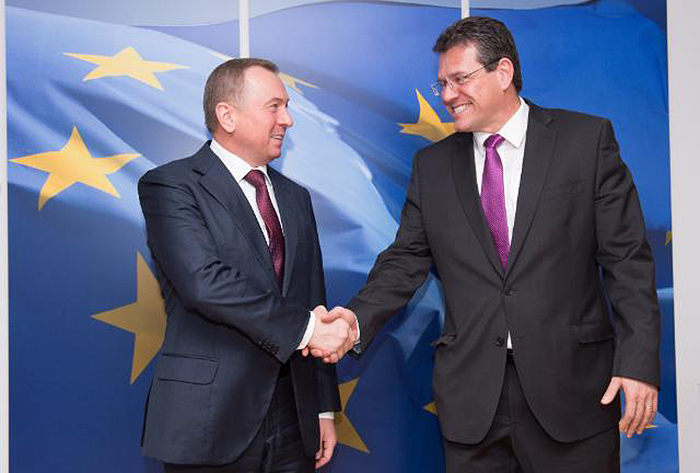Threats to Belarus, Ukrainian Border, Cooperation with Kazakhstan – Belarus Security Digest

Image: gomel.today
Minsk wants to maintain its own position in the latest confrontation between NATO and Russia in the region. Various Belarusian officials state that they see no immediate threat to Belarus from NATO, but rather from a possible internal conflict like those that occurred in Ukraine and Arab countries.
The Belarusian government is more preoccupied with bringing the Ukrainian border under control. Minsk is hastily demarcating the border and providing its troops there the best equipment. However, this process has already caused problems on the ground.
Minsk wants no fuss about NATO
Speaking on 7 June at a CIS conference, Belarusian president Alexander Lukashenka said in response to new NATO forces arriving on the western border of Belarus that “without much fuss we are adopting adequate measures.”
That is exactly the opposite of what the Kremlin would like to see i.e. some form of demonstrative response to NATO. Minsk has already resisted Moscow's plans to move some Russian military units inside Belarus.
NATO deployments, drills and the development of NATO infrastructure along Belarusian borders is “a potential challenge for the Union State of Belarus and Russia.” Read more
Speaking on 3 June to Cuban news agency Prensa Latina, Belarusian Deputy Foreign Minister Yauhen Shastakou provided more insight into how the Belarusian leadership perceives the growing confrontation in the region. First, Shastakou emphasised that new NATO deployments, drills and the development of NATO infrastructure along Belarusian borders is “a potential challenge for the Union State of Belarus and Russia.” Not a challenge for Belarus alone, in other words, and just a potential, not current problem.
Secondly, he criticised the inclination of all key players on the European continent to increase their military capacities and added: "We do not share the approach based on placing additional foreign military facilities and forces on one's own territory. We believe that such actions weaken the security of a particular state."
Said in the official parlance of the Belarusian government, the message was rather clear: Minsk wants no Russian military bases on its territory and instead is seeking an understanding with its neighbours. Indeed, while accepting the letter of credence from the new Polish ambassador on 6 June, Lukashenka announced that Belarus “shares with Poland the responsibility for security in the region.”
Potential risks according to him stem from so-called hybrid wars that involve foreign forces Read more
Speaking on 7 June at a round table on the new military doctrine organised by the main government media outlet Belarus Segodnya, Aleh Pechan', director of the Military Security Department of the State Secretariat of the Security Council underlined: “There is currently no military threat to Belarus. And we do not forecast its emergence in the foreseeable future.” Potential risks according to him stem from so-called hybrid wars that involve foreign forces provoking internal armed conflict within another country.
This vision combines fears of what has happened to both Ukraine and to Arab countries in recent years. And it is definitely a far cry from Russia's perception of the global confrontation with NATO and US.
Border with Ukraine: still not under control?
Belarus' 1,084km border with Ukraine remains a major concern for Minsk. In a press conference on 26 May Chairman of the State Border Committee Leanid Maltsau admitted that “misunderstandings” were occurring in the course of demarcation of the border with Ukraine.
He specifically referred to the protests by Ukrainian citizens living near the demarcation line in Ukraine's Volyn' province. Minsk is trying to suppress media coverage of any conflict situation that involve Ukraine (for instance, cases of arms smuggling are reported late and probably not in full).
The situation on the border with Ukraine's Volyn province might also be more serious than Maltsau conceded. The Poland-based Radio Racyja reported in early May that “the demarcation [by the Belarusian government] of the Belarus-Ukrainian border in Volyn' province is being blocked by local residents.” Apparently, these protests are linked to the massive illegal extraction of amber in the region which requires large quantities of water from a canal that the Belarusians are going to put behind the border fence.
After Ukrainian villagers threatened to burn down Belarusian construction equipment, the Belarusians halted the demarcation process in February Read more
After Ukrainian villagers threatened to burn down Belarusian construction equipment, the Belarusians halted the demarcation process in February. The conflict remained unresolved in early May at least.
Minsk, concerned about a possible spill-over of violence from the war in Ukraine and weapons smuggling, is silently yet consistently investing in closing the frontier with Ukraine. The official military daily Belorusskaya voennaya gazeta on 4 May printed another report revealing details of these efforts.
It described the Border Outpost Svaryn' of the Pinsk Border Brigade which guards the border between Brest province in Belarus and Volyn province in Ukraine. The report admitted that the border outpost “was constructed in summer 2015 in a very short time”, but kept silent on the reasons for this haste.
It also avoided discussing the fact that the Svaryn' outpost guards 40km of the border while in Soviet and post-Soviet security establishments an outpost covers on average just 15-25km. Moreover, these 40km include rough terrain featuring lakes, swamps, and numerous small and large waterways. Smuggling is a tradition in the region.
And there are places on the Ukrainian border where the situation is even worse. For instance, last year the Mazyr Border Brigade guarded 377km of the border, including 48km of waterways with just four outposts, one mobile outpost and two small border posts; that's about 70km per outpost. There is no information on whether the situation has improved this year.
Minsk is struggling to compensate for the scarcity of human resources with equipment. Read more
Minsk is struggling to compensate for the scarcity of human resources with equipment. The official army daily in the article mentioned above boasted of state-of-art electronics, communication equipment and quadracycles. Yet it also revealed that Pinsk Border Brigade has become the first in the country to not only operate surveillance drones but even to deploy in 2015 autogyros to control the border. The Belarusian government even bought Italian Orion autogyros.
Kazakhstan as a new priority
Kazakhstan may become another major post-Soviet partner in the defence sphere, alongside Ukraine. On 25-28 March First Deputy Defence Minister of Kazakhstan Saken Zhasuzakov paid an official visit to Belarus.
Meanwhile, on 2-3 June Belarusian Defence Minister Andrei Raukou paid a working visit to Kazakhstan. As a result of these contacts Belarusian and Kazakhstani firms concluded two major deals. The first concerns sales of Kazakhstani components for Belarusian sight devices; the second provides for repairs to be carried out by Belarusian firms to Kazakhstani Su-25 close air support aircraft.
On 16-20 May a military delegation from the United Arab Emirates came to Belarus. It fits the pattern of Belarusian foreign policy that prioritises cooperation with the bloc of conservative Arab countries in the Middle East. Indeed, on 12 April Raukou also had a formal meeting the Syrian ambassador , and on 27 April he may have met the Iranian Defence Minister. However neither meeting was very substantive.




 was warranted by the
was warranted by the  In fact, this trip should not be perceived in this context. Rather, it was a long-sought
In fact, this trip should not be perceived in this context. Rather, it was a long-sought  On 25 May, Belarusian and South Korean officials met under the format of the economic cooperation commission in Minsk. Contact with developing countries also included a visit by a deputy minister for industry from Syria and political consultations with Mozambique.
On 25 May, Belarusian and South Korean officials met under the format of the economic cooperation commission in Minsk. Contact with developing countries also included a visit by a deputy minister for industry from Syria and political consultations with Mozambique. Despite the Group’s strong rejection of same-sex unions, the joint statement initiated by Belarus avoids using confrontational language. However, it invites the UN agencies and officials “to refrain from any inherent controversial actions that depart from the widely accepted family concept”.
Despite the Group’s strong rejection of same-sex unions, the joint statement initiated by Belarus avoids using confrontational language. However, it invites the UN agencies and officials “to refrain from any inherent controversial actions that depart from the widely accepted family concept”.
